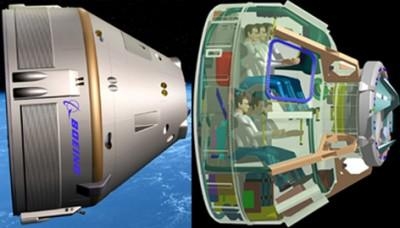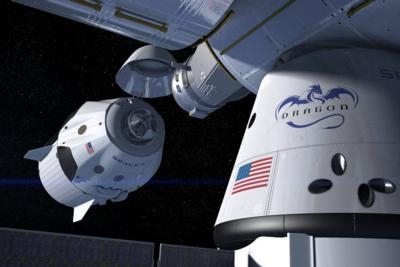Tue, Jan 30, 2018
First Unmanned Tests For Boeing And SpaceX Not Planned Until Later This Year
NASA has updated its information concerning the tests and eventual operational status for its Commercial Crew programs that will carry astronauts to ISS from a U.S. Spaceport. But it's not likely to happen until at least sometime in 2019, and maybe not until 2020.

Spaceflight Insider cites Ars Technica in reporting that both Boeing and SpaceX have said they are confident that unmanned flights will occur this year, but there is skepticism in Congress, particularly among members of the House Subcommittee on Space during a recent hearing.
Similarly, a GAO report released January 17 indicates that both companies continue to experience schedule delays. "Such delays could jeopardize the ability of the NASA Commercial Crew Program to certify either company’s option—that is, to ensure that either option meets NASA standards for human spaceflight—before the seats the agency has contracted for on Russia's Soyuz spacecraft run out in 2019," the report states.
GAO's ongoing work has identified three key risks, which are consistent with challenges reported in February 2017 that could further delay certification of each contractor’s crew transportation system:
- Aggressive schedules—NASA, Boeing, SpaceX, and independent review bodies have all noted that the contractors’ schedule plans are aggressive. The anticipated schedule risks have since materialized.
- Programmatic and safety risks—SpaceX and Boeing are addressing technical risks, which is not uncommon for NASA projects as they often push the state of the art in space technology. In addition, the contractors’ systems must meet a standard for crew safety. Additional work remains to determine whether the contractors will meet this requirement.
- Program office workload—Program officials told GAO that one of their greatest upcoming challenges will be to complete two oversight activities—conducting phased safety reviews and verifying that contractors meet requirements—concurrently. The program’s ability to smooth its workload is limited, as the contractors generally control their development schedules. In February 2017, GAO found that proposed schedule changes could alleviate some overlap.

Delays and uncertain final certification dates raise questions about whether the United States will have uninterrupted access to the ISS after 2019, and may lessen NASA’s return on investment with the contractors. GAO says it will continue to assess the contractors' and program’s progress.
(Source: GAO report and as cited. Images from file)
More News
From 2021: The Inside Skinny On What Being An ANN Oshkosh Stringer Is All About By ANN Senior Stringer Extraordinare, Gene Yarbrough The annual gathering at Oshkosh is a right of p>[...]
Video Showed That During The Takeoff, The Nose Baggage Door Was Open On May 10, 2025, about 0935 eastern daylight time, a Piper PA-32RT-300, N30689, was destroyed when it was invol>[...]
Get The Latest in Aviation News NOW on Instagram Are you on Instagram yet? It's been around for a few years, quietly picking up traction mostly thanks to everybody's new obsession >[...]
"I think what is key, we have offered a bonus to air traffic controllers who are eligible to retire. We are going to pay them a 20% bonus on their salary to stay longer. Don't reti>[...]
Aero Linx: Pilot Briefing The gathering, translation, interpretation, and summarization of weather and aeronautical information into a form usable by the pilot or flight supervisor>[...]
 Oshkosh Memories: An Aero-News Stringer Perspective
Oshkosh Memories: An Aero-News Stringer Perspective NTSB Prelim: Piper PA32RT
NTSB Prelim: Piper PA32RT ANN FAQ: Follow Us On Instagram!
ANN FAQ: Follow Us On Instagram! Aero-News: Quote of the Day (05.28.25)
Aero-News: Quote of the Day (05.28.25) ANN's Daily Aero-Term (05.28.25): Pilot Briefing
ANN's Daily Aero-Term (05.28.25): Pilot Briefing




